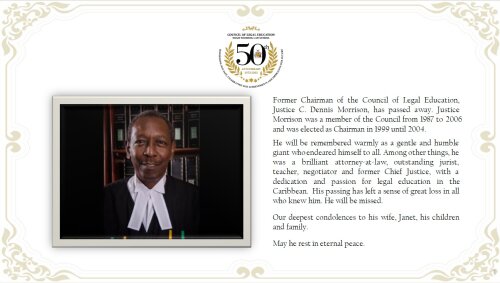Best Marriage Lawyers in Port of Spain
Share your needs with us, get contacted by law firms.
Free. Takes 2 min.
Free Guide to Hiring a Family Lawyer
List of the best lawyers in Port of Spain, Trinidad and Tobago
About Marriage Law in Port of Spain, Trinidad and Tobago
Marriage laws in Port of Spain, Trinidad and Tobago are governed by the Marriage Act, the Hindu Marriage Act, the Muslim Marriage and Divorce Act, and the Orisa Marriage Act. These laws stipulate the legality and legitimacy of various types of marriages in the twin-island country. They cover various aspects such as age consent, required witnesses, waiting periods, recognition of non-national marriages, and everything in between.
Why You May Need a Lawyer
There are numerous situations in which seeking legal advice regarding marriage can be advantageous. Some of these situations include preparation and understanding of prenuptial agreements, understanding the legal implications and expectations of marriage, handling of legal name changes, and offering guidance in divorce or separation cases. Additionally, if your marriage involves aspects like property rights, child custody, or immigration issues, legal advice can be invaluable to safeguard your rights and interests.
Local Laws Overview
Local Trinidadian law stipulates that individuals must be at least 18 years old to marry without parental consent. Witnesses are required, and there's a stipulated waiting period after filing of the marriage licence application. Non-nationals can marry in Trinidad and Tobago after residing in the country for at least 3 days. Also, each type of marriage, Hindu, Muslim or Orisa has different stipulations. These details underscore the importance of understanding the precise local laws concerning your marriage.
Frequently Asked Questions
1. Can I get married if I am a non-national?
Yes, non-nationals can get married in Trinidad and Tobago after residing in the country for at least three days.
2. Are civil unions or same-sex marriages recognized?
As of now, Trinidad and Tobago does not officially recognize civil unions or same-sex marriages.
3. What if I want a prenuptial agreement?
Prenuptial agreements are enforceable under Trinidad and Tobago legal system and it's recommended to consult with a lawyer to ensure correct setup and execution.
4. What are the laws regarding divorce in Trinidad and Tobago?
Divorce is legal in Trinidad and Tobago. However, there are certain stipulations such as having been married for a certain period of time and living separately for a certain duration.
5. What about child custody in case of divorce?
Child custody disputes are settled in court in the best interest of the child. Biological parents, step-parents, and guardians can all apply for custody rights.
Additional Resources
Some useful resources include the Trinidad and Tobago Government's website which provides detailed information about marriage procedures. Additionally, the Family Law Act provides comprehensive insights about prenuptial agreements, divorce procedures, child custody, and other family-related legal areas. Legal aid services are also available throughout the country providing free or affordable legal assistance.
Next Steps
If you require legal assistance pertaining to marriage in Trinidad and Tobago, the recommended first step would be to consult with a lawyer who specializes in family law. They can provide you with tailored advice according to your unique circumstances. Additionally, checking with the Ministry of Legal Affairs can also provide useful resources and guidance.
Lawzana helps you find the best lawyers and law firms in Port of Spain through a curated and pre-screened list of qualified legal professionals. Our platform offers rankings and detailed profiles of attorneys and law firms, allowing you to compare based on practice areas, including Marriage, experience, and client feedback.
Each profile includes a description of the firm's areas of practice, client reviews, team members and partners, year of establishment, spoken languages, office locations, contact information, social media presence, and any published articles or resources. Most firms on our platform speak English and are experienced in both local and international legal matters.
Get a quote from top-rated law firms in Port of Spain, Trinidad and Tobago — quickly, securely, and without unnecessary hassle.
Disclaimer:
The information provided on this page is for general informational purposes only and does not constitute legal advice. While we strive to ensure the accuracy and relevance of the content, legal information may change over time, and interpretations of the law can vary. You should always consult with a qualified legal professional for advice specific to your situation.
We disclaim all liability for actions taken or not taken based on the content of this page. If you believe any information is incorrect or outdated, please contact us, and we will review and update it where appropriate.














